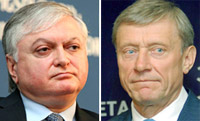The Armenian president has decided not to participate in NATO summit in Chicago because of the worrisome formulations in the summit’s resolution. The Armenian foreign minister Edward Nalbandyan said about this during a meeting with the Armenian community of Chicago. The declaration mentions the unresolved conflicts in Nagorno-Karabakh as well as Georgia and Moldova in a long list of security challenges facing the West. It seems to single out territorial integrity of internationally recognized states as the guiding principle for their peaceful resolution. “That could harm not only the Nagorno-Karabakh negotiating process but also jeopardize the shaky situation in the region, especially against backdrop of an unprecedented rise in Azerbaijan’s military spending and its leadership’s bellicose rhetoric,” Nalbandyan reportedly said.
The NATO resolution writes the following: “We remain committed in our support of the territorial integrity, independence, and sovereignty of Armenia, Azerbaijan, Georgia, and the Republic of Moldova, and will also continue to support efforts towards a peaceful settlement of these regional conflicts, based upon these principles and the norms of international law, the United Nations Charter, and the Helsinki Final Act.”
Certainly, being an experienced diplomat Nalbandyan did not tell the Diaspora representatives whether it was correct not to answer to the worrisome provisions at the level of the president and by criticizing those provisions rather than at the level of foreign minister by boycotting. Even though if the president did not have an opportunity to criticize in his speech, he could do that during meetings and in interviews with media. By boycotting and refusing to visit Chicago, Sargsyan lost an opportunity to meet leaders of several countries and talk to them on this topic. The leaders of the other two countries of Caucasus (Georgia and Azerbaijan) are in Chicago. Why did the Armenian government make this decision? The answer to this question was given by Nikolay Bordyuzha, the general secretary of the Collective Security Treaty Organization, during a TV bridge between Moscow, Kiev, Kishinev, Astana and Yerevan. He said that the CSTO leaders had agreed in advance the format of their participation in NATO summit to take place in Chicago on May 20-21. “The format of participation in the summit has been decided at a sovereign level, but the leaders exchanged with ideas while being in Moscow,” Bordyuzha said. The statement “sovereign level” looks too funny because Bordyuzha said with an open text that Moscow was the one to decide the issue of participation in the summit on the part of the CSTO leaders, including Armenia as well. In this context it is even funnier to look at the discussions of the political powers concerning changing the foreign policy directions after the parliamentary elections. This means that Moscow’s policy toward the government of our country, which has received high estimations from the Eastern countries, has not really changed. This is also an answer to those opposition political powers that have recently become pro-Russian. This means that it is again time to change the policy directions.

